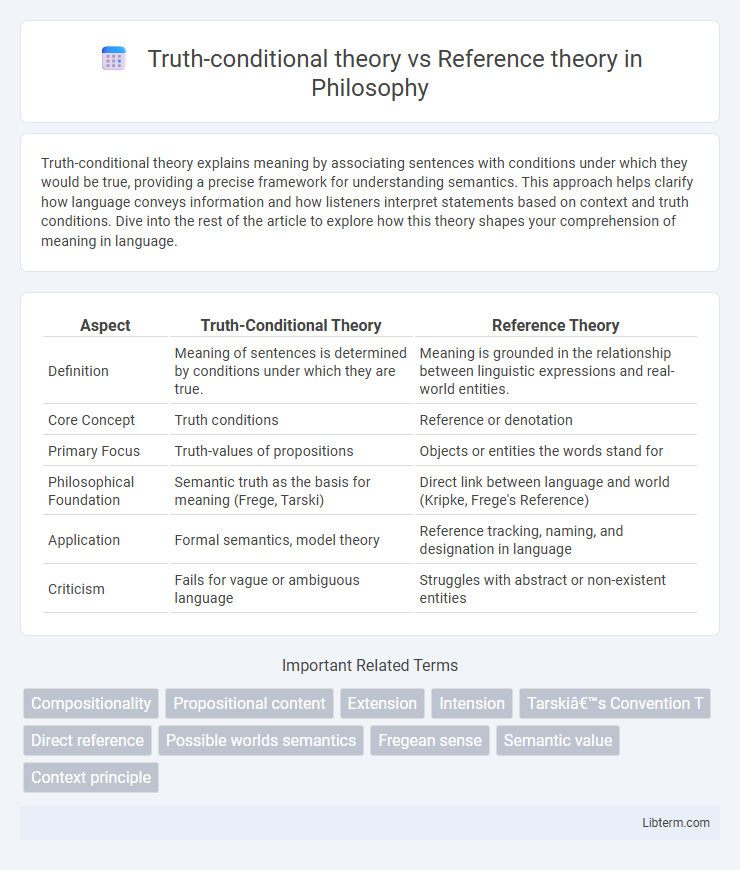Truth-conditional theory explains meaning by associating sentences with conditions under which they would be true, providing a precise framework for understanding semantics. This approach helps clarify how language conveys information and how listeners interpret statements based on context and truth conditions. Dive into the rest of the article to explore how this theory shapes your comprehension of meaning in language.
Table of Comparison
| Aspect | Truth-Conditional Theory | Reference Theory |
|---|---|---|
| Definition | Meaning of sentences is determined by conditions under which they are true. | Meaning is grounded in the relationship between linguistic expressions and real-world entities. |
| Core Concept | Truth conditions | Reference or denotation |
| Primary Focus | Truth-values of propositions | Objects or entities the words stand for |
| Philosophical Foundation | Semantic truth as the basis for meaning (Frege, Tarski) | Direct link between language and world (Kripke, Frege's Reference) |
| Application | Formal semantics, model theory | Reference tracking, naming, and designation in language |
| Criticism | Fails for vague or ambiguous language | Struggles with abstract or non-existent entities |
Introduction to Truth-Conditional and Reference Theories
Truth-conditional theory explains meaning by specifying the conditions under which a statement is true, emphasizing the role of propositions in determining truth values. Reference theory centers on the relationship between linguistic expressions and the real-world entities they denote, focusing on how terms correspond to actual objects or concepts. Both approaches address how language connects to reality but differ in prioritizing truth conditions versus direct referential links.
Historical Background and Key Philosophers
Truth-conditional theory originated in the mid-20th century with philosophers like Donald Davidson and Richard Montague focusing on the conditions under which statements are true, thereby linking semantics closely with formal logic. In contrast, reference theory traces back to early analytic philosophy, especially the works of Gottlob Frege and Bertrand Russell, emphasizing the direct relationship between language and the world through referents. These foundational approaches have shaped contemporary debates in semantics, influencing how meaning is analyzed in linguistic expressions.
Core Principles of Truth-Conditional Theory
Truth-conditional theory centers on the principle that the meaning of a sentence is determined by the conditions under which it would be true, emphasizing the role of truth values in semantic interpretation. It asserts that understanding a sentence involves knowing what the world must be like for the sentence to hold true. In contrast, Reference theory focuses on the relationship between linguistic expressions and their corresponding objects or entities in the real world, highlighting referential links rather than truth conditions.
Foundational Concepts of Reference Theory
Reference theory centers on the direct relationship between language expressions and the objects or entities they denote in the real world, emphasizing the role of context and speaker intentions in establishing meaning. This approach holds that meaning primarily depends on the referent that a term picks out, rather than on truth conditions associated with propositions. Foundational concepts include the notions of rigid designators, proper names, and demonstratives, which are crucial for understanding how linguistic expressions anchor to specific objects across possible contexts.
Meaning and Interpretation: A Comparative Analysis
Truth-conditional theory defines meaning through conditions under which a statement is true, emphasizing semantic content as tied to truth values and propositional logic. Reference theory, by contrast, grounds meaning in the relationship between linguistic expressions and real-world entities, stressing the referential function of language for interpretation. This comparative analysis highlights truth-conditional theory's focus on semantic truth conditions versus reference theory's focus on external referents in meaning construction and language comprehension.
Strengths and Criticisms of Truth-Conditional Theory
Truth-conditional theory excels in providing a clear framework for understanding meaning by linking sentence truth conditions directly to their semantic content, facilitating precise semantic analysis and logical consistency. Critics argue it struggles with addressing meaning in ambiguous, context-dependent, or non-declarative expressions and often overlooks pragmatic aspects influencing interpretation. Despite these limitations, truth-conditional semantics remains foundational for formal linguistic theory and computational language models aiming to represent meaning systematically.
Strengths and Criticisms of Reference Theory
Reference theory offers the strength of directly linking linguistic expressions to real-world entities, enabling precise communication and clear disambiguation in context. It facilitates understanding by grounding meaning in observable referents, which is particularly effective in concrete, factual discourse. However, the theory faces criticism for its limited application to abstract concepts, idiomatic language, and sentences lacking clear external references, revealing challenges in capturing the full complexity of meaning beyond mere referential connections.
Applications in Linguistics and Philosophy
Truth-conditional theory emphasizes the conditions under which statements are true, playing a crucial role in semantics by providing frameworks for interpreting meaning and truth in natural language processing and formal logic analysis. Reference theory centers on the relation between linguistic expressions and real-world entities, impacting theories of meaning in philosophy and influencing cognitive linguistics in understanding how language refers to objects and concepts. Both theories contribute to discourse analysis, epistemology, and the development of artificial intelligence systems for language comprehension.
Contemporary Debates and Developments
Contemporary debates in truth-conditional theory emphasize its capacity to model meaning through truth conditions, while critics argue that it struggles with context-dependent expressions and pragmatic nuances. Reference theory developments focus on the direct link between linguistic expressions and real-world entities, addressing challenges from indexicals and non-literal language in communication. Recent interdisciplinary research integrates cognitive semantics and formal pragmatics to reconcile these approaches, advancing semantic theory toward more comprehensive models of meaning.
Conclusion: Weighing Truth-Conditional and Reference Theories
Truth-conditional theory emphasizes the conditions under which statements are true, offering a precise framework for semantic meaning based on truth values in possible worlds. Reference theory prioritizes the relationship between linguistic expressions and their real-world counterparts, highlighting how meaning is grounded in objects or entities designated by language. Weighing both theories reveals that truth-conditional semantics excels in explaining propositional content, while reference theory is crucial for understanding naming and direct reference, suggesting an integrative approach best captures the complexity of meaning.
Truth-conditional theory Infographic

 libterm.com
libterm.com